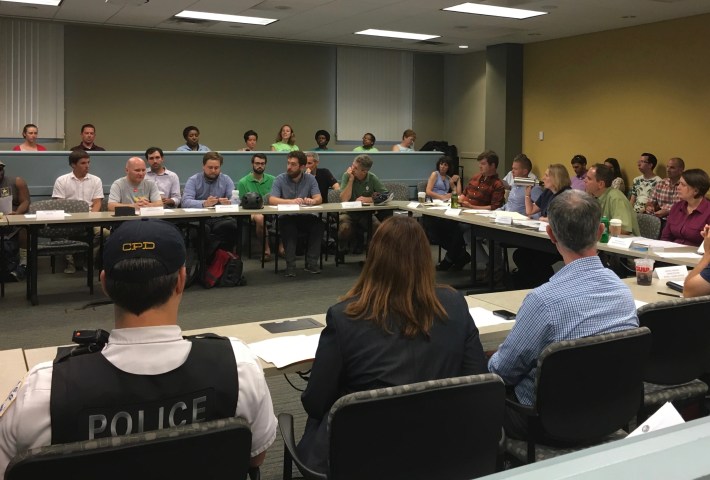
About 45 "civilians" – people who weren't obligated to attend – showed up for yesterday's Mayor's Bicycle Advisory Council meeting yesterday, making it one of the most democratic MBAC meetings ever. The council, which meets quarterly at City Hall during the workday, usually draws only about 10-15 attendees who aren't there in an official capacity, many of whom are regulars who show up for almost every meeting.
At the MBAC meetings staff from the Chicago Department of Transportation, the Chicago Park District, Divvy, and the Active Transportation Alliance report on their recent and upcoming projects to make the city more bike-friendly. One reason for the big turnout from yesterday was this summer's epidemic of fatal crashes. Since the previous MBAC meeting in June, four people biking were struck and killed in Chicago by reckless drivers of commercial vehicles within the space of about two months.
After art student Lisa Kuivenen was killed by a truck driver in a Milwaukee bike lane on August 16, and North Lawndale resident Francisco Cruz was fatally struck by a hit-and-run cargo van driver the next evening, I decided to encourage people to show up for the next MBAC meeting. That way more residents would hear for themselves what city officials say they're doing to prevent more of these tragedies.
I'm a member of the 33rd Ward transportation advisory committee, so I invited alder Deb Mell to the meeting, and she attended. Mell's district includes the intersection where Divvy rider Virginia Murray was run over on July 1 by a truck driver who turned right without looking.
I also created a Facebook event and posted about the upcoming meeting on Streetsblog last week, which likely encouraged many new attendees to come. Show up they did, and the meeting was better for it. With more citizens in attendance, transportation commissioner Rebekah Scheinfeld, assistant commissioner Sean Wiedel, who oversees the Divvy program, and assistant director of transportation planning Mike Amsden, who manages CDOT's bikeway program, seemed to answer questions a little more directly than in the past.
There were no bike fatalities in Chicago prior to the June 15 death of courier Blaine Klingenberg, who was fatally struck by a tour bus driver. Scheinfeld noted that the four bike fatalities that have occurred so far this year are in line with the year-to-date average for the last five years. However, she said, "just because we're on average doesn't mean that's okay."
Multiple CDOT staffers noted during the course of meeting that while it's important that residents show up to MBAC meetings, it's also important for them to lobby for better conditions for biking within their own communities. For example, by talking with aldermen and local business owners about the benefits of good bike infrastructure, residents can help drum up political support for robust bike facilities.
This was good advice. Political support can make the difference between CDOT being able to install protected or buffered lanes, rather than inferior bikeways like conventional bike lanes or shared-lane markings. We saw this phenomenon play out on the Northwest Side in 2014, when backlash from residents killed a CDOT proposal to build protected lanes on Milwaukee Avenue north of the Jefferson Park Transit Center.
Some other comments by Scheinfeld seemed a bit off the mark. "This goal of eliminating fatalities and serious injuries, is only achievable if we all work together," she said. "It's not just about our built environment, it's about changing behaviors. It's important for each of you for being ambassadors to help spread the message."
She asked that people in the room "lead by example" and "think of yourselves as an unofficial ambassador" for safe streets when walking, bicycling, or driving in the city. She even suggested "calling out other people" for unsafe or inconsiderate behavior on the roadway if one felt comfortable doing so.
That sounded a little like last week's misguided Tribune editorial that, in the wake of the four deaths, urged "Bicyclists be careful. Motorists, be watchful. Everyone, slow down." Everyone should travel responsibly and mindfully, whether they're on foot, on bike, or in a car. But the the greatest responsibility lies with those piloting multi-ton vehicles that can easily kill people.
Likewise, Scheinfeld downplayed CDOT's own power and responsibility to prevent traffic deaths as the chief implementer of new street designs in Chicago. (The Illinois Department of Transportation does this, too). The department also serves as the mayor's expert on transportation policy and will be leading the city's just-announced Vision Zero initiative to eliminate traffic fatalities by 2026. Of course the police department has a major role to play as well, by enforcing traffic laws and ensuring reckless drivers receive citations.
"I know there are folks here today who want to talk about [the bicyclist deaths] more, but I want to reiterate CDOT's mission," Scheinfeld added. "We're working to provide safe, affordable, efficient, and effective transportation options all over the city regardless of age or ability. We're thinking about all modes. Pedestrians, bicyclists, people taking transit, and people driving in cars and trucks."
Scheinfeld is right that the built environment isn't the only factor in preventing future bike deaths and other traffic fatalities, but it's the most important one. Redesigning the physical layout of streets is the most effective way to change driver behavior for the better.
Still, I think the message was heard: It's easier for CDOT to get approval to redesign streets to become safer for bicyclists – infrastructure for which percolates into making it safer to walk and drive, too – when those at meetings like MBAC express their support for these projects to elected officials and business leaders.
This post is made possible by a grant from the Illinois Bicycle Lawyers at Keating Law Offices, P.C., a Chicago, Illinois law firm committed to representing pedestrians and cyclists. The content is Streetsblog Chicago's own, and Keating Law Offices neither endorses the content nor exercises any editorial control.





